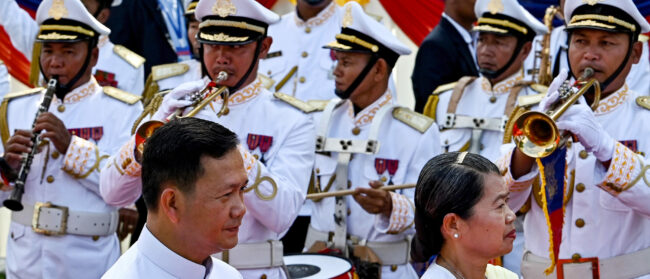Ruak, the leader of AMP’s second largest party, emerged as the favourite to take the prime minister’s chair, despite early predictions from international media that national hero and coalition kingmaker Xanana Gusmão would install himself for a second prime ministerial stint.
Many analysts see Ruak’s appointment as a strategic decision that could bridge the ideological divide between his grassroots People’s Liberation Party (PLP) and AMP’s largest party, Gusmão’s big-spending National Congress for Timorese Reconstruction (CNRT).
“It will be interesting to see how the new government combines Gusmão’s Strategic Development Plan, which focuses on government spending on major infrastructure projects, with the PLP policy of boosting basic development spending on health, agriculture and education,” said Michael Leach, a professor of politics and international relations at Australia’s Swinburne University.
“The appointment of [Ruak] as prime minister suggests some mid-way point between the two development platforms may be negotiated,” he added.
Ruak, the country’s president between 2012 and 2017, was a vocal opponent in parliament to then-Prime Minister Gusmão’s spending decisions. While some hail Ruak’s appointment as a sign of a buried hatchet between the incendiary pair, Leach believes Gusmão will remain immensely powerful in the new government.
“New policies are unlikely to emerge without his approval,” Leach said. “But PLP clearly has the opportunity to mould the direction of this government.”
In the new government, Gusmão will act as minister adviser to Ruak, while continuing to preside over Timor-Leste’s maritime boundaries and oil and gas development.
Gusmão, while serving as chief negotiator for Timor-Leste during its long-running maritime boundary battle with neighbouring Australia, pledged that oil and gas resources in the Timor Sea would be piped to Timor-Leste’s south coast for onshore processing, a plan widely considered risky and unviable. According to an assessment issued by an independent consultant, the cost of such a plan would amount to $5.6 billion, roughly four times Timor-Leste’s GDP.
Gusmão, a former president and prime minister, famously resigned from his prime ministership in 2015 and handed the role to Rui de Araújo, who led the left-leaning party Revolutionary Front for an Independent Timor-Leste (Fretilin), thus creating an informal power-sharing agreement between two previously opposed parties.
That agreement crumbled at the July 2017 parliamentary election, which saw Fretilin form a minority government unable to gain parliamentary support for its programme. President Francisco Guterres called an unprecedented early election in January in response to the stalemate, which resulted in AMP’s victory and this current scramble to fill ministries.
Despite the perception of business returning to normal, Leach pointed to the 10-year age gap between Gusmão and Ruak as a promising sign of a long-awaited transition to new leadership for Timor-Leste. Approximately 70% of Timor-Leste’s population is under the age of 30, and young voters are increasingly calling for a younger, more policy-focused leadership.
AMP’s third coalition member, Khunto, is a youth party focused on youth unemployment – and also connected with martial arts groups. It is believed the party has secured four ministries in the new government.
The decisive election result and the strong showing of competitor Fretilin could bind the parties beyond their differences – despite the ideological differences of AMP’s members.
“Unity within the new AMP coalition is likely to be enhanced by Fretilin’s relatively strong performance at the 2018 election, which reduces the prospect of division,” Leach said.
He added: “Nevertheless, with quite divergent views on development policies, there is the potential for tension within the new government on the key areas of infrastructure spending and health and education funding.”
Ruak’s challenge now remains to deliver an effective development agenda without upsetting the coalition’s delicate harmony or treading on Gusmão’s formidable toes.


